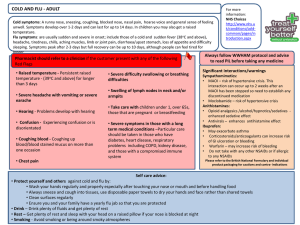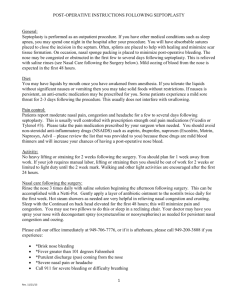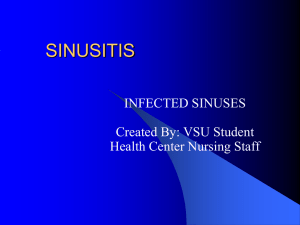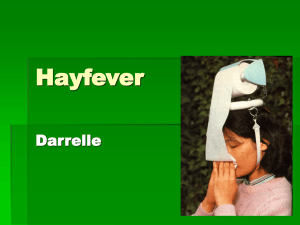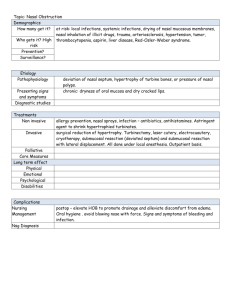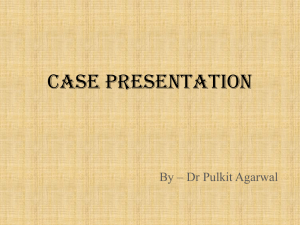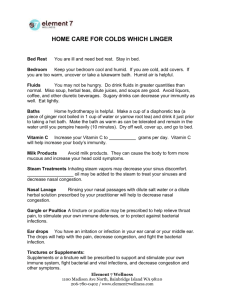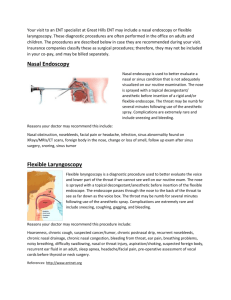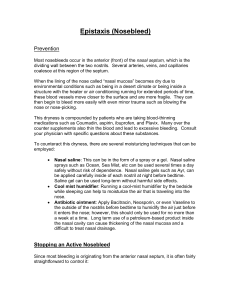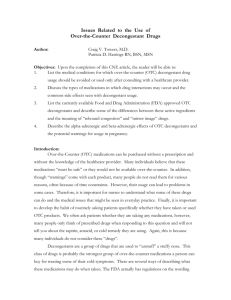Treating+a+common+cold
advertisement
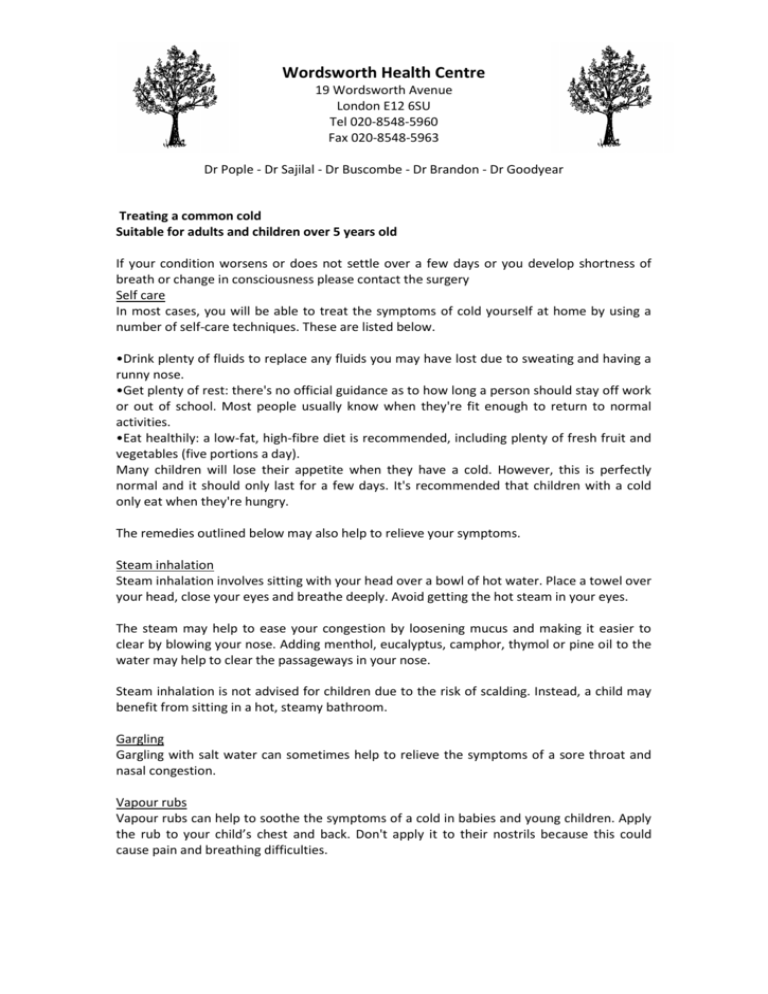
Wordsworth Health Centre 19 Wordsworth Avenue London E12 6SU Tel 020-8548-5960 Fax 020-8548-5963 Dr Pople - Dr Sajilal - Dr Buscombe - Dr Brandon - Dr Goodyear Treating a common cold Suitable for adults and children over 5 years old If your condition worsens or does not settle over a few days or you develop shortness of breath or change in consciousness please contact the surgery Self care In most cases, you will be able to treat the symptoms of cold yourself at home by using a number of self-care techniques. These are listed below. •Drink plenty of fluids to replace any fluids you may have lost due to sweating and having a runny nose. •Get plenty of rest: there's no official guidance as to how long a person should stay off work or out of school. Most people usually know when they're fit enough to return to normal activities. •Eat healthily: a low-fat, high-fibre diet is recommended, including plenty of fresh fruit and vegetables (five portions a day). Many children will lose their appetite when they have a cold. However, this is perfectly normal and it should only last for a few days. It's recommended that children with a cold only eat when they're hungry. The remedies outlined below may also help to relieve your symptoms. Steam inhalation Steam inhalation involves sitting with your head over a bowl of hot water. Place a towel over your head, close your eyes and breathe deeply. Avoid getting the hot steam in your eyes. The steam may help to ease your congestion by loosening mucus and making it easier to clear by blowing your nose. Adding menthol, eucalyptus, camphor, thymol or pine oil to the water may help to clear the passageways in your nose. Steam inhalation is not advised for children due to the risk of scalding. Instead, a child may benefit from sitting in a hot, steamy bathroom. Gargling Gargling with salt water can sometimes help to relieve the symptoms of a sore throat and nasal congestion. Vapour rubs Vapour rubs can help to soothe the symptoms of a cold in babies and young children. Apply the rub to your child’s chest and back. Don't apply it to their nostrils because this could cause pain and breathing difficulties. Wordsworth Health Centre 19 Wordsworth Avenue London E12 6SU Tel 020-8548-5960 Fax 020-8548-5963 Dr Pople - Dr Sajilal - Dr Buscombe - Dr Brandon - Dr Goodyear Menthol sweets Some people find that sucking a menthol sweet can help to relieve the symptom of a sore throat. Nasal saline drops Nasal saline drops or sprays can help relieve the symptoms of nasal congestion in babies and young children. Nasal saline drops contain salt water so they're thought to work in the same way as gargling salt, but they're often better tolerated in babies and young children. Nasal saline drops or sprays are available from most pharmacists. Over-the-counter cold medications In England, over-the-counter (OTC) cold medicines are probably the most widely used type of medication. However, there isn’t much evidence that certain OTC medications are effective. Painkillers such as ibuprofen, paracetamol and aspirin are the only type of medication known to be effective in treating colds. Children who are under 16 years old or women who are breastfeeding should not take aspirin. Decongestants (medications designed to reduce nasal congestion) may have some limited effectiveness against colds. However, don't use them for more than five to seven days because overuse can make the symptoms of congestion worse. There's no evidence to support the use of antihistamines or cough syrups in treating a cold. The use of antibiotics to treat a cold is not recommended. As almost all cases of cold are caused by a viral infection, antibiotics won't have any benefit, and may cause unpleasant side effects, such as nausea and diarrhoea. Most OTC cold medications aren't suitable for children under six years old. If your child is unwell, talk to your pharmacist about the best option if you need an OTC medication. Many OTC medications contain a combination of different medicines; typically a painkiller, such as paracetamol, and a decongestant, such as pseudoephedrine. If you have recently taken an OTC cold medication, it may not be safe for you to take an additional painkiller. Read the manufacturer’s patient information leaflet carefully before taking the medication, and follow the recommended dosage instructions. More information about specific OTC medication is provided below. Wordsworth Health Centre 19 Wordsworth Avenue London E12 6SU Tel 020-8548-5960 Fax 020-8548-5963 Dr Pople - Dr Sajilal - Dr Buscombe - Dr Brandon - Dr Goodyear Decongestants Decongestants can be taken by mouth (oral decongestants) or they can be taken as a spray in your nose (nasal decongestants). They work by reducing the swelling in the passageways of your nose and they may also help to ease breathing. There's limited evidence to show how effective decongestants are. This type of medication may only relieve some people from their cold symptoms. Also, when decongestants do work, they often only ease symptoms for a short period of time. However, decongestants are a safe and rarely cause serious side effects. If you use nasal decongestants frequently or for a long time, your congestion may end up getting worse. Don't give any form of oral decongestant to a child under six years old, as it may cause adverse side effects. Oral decongestants can cause a rise in blood pressure and heart rate, leading to a feeling of being more alert. Therefore, if you take OTC decongestants at bedtime, you may have problems sleeping at night. Oral decongestants, such as pseudoephedrine, phenylpropanolamine and phenylephrine are used in many OTC cold remedies. Oral decongestants may interact with some antidepressants and beta-blockers. If you're taking either of these medicines, check with your GP or pharmacist before taking oral decongestants. If you have high blood pressure (hypertension), heart problems or glaucoma (a group of eye conditions that affect vision), check with your GP before using an oral decongestant. Nasal decongestants work specifically on the nose. They're usually safe for adults and older children to use. Nasal decongestants, such as oxymetazoline, xylometazoline, phenylephrine and ephedrine are applied directly to the inside of the nose. They are available as nose drops or sprays. Nasal decongestants shouldn't be used for more than five to seven days because using them for longer can actually make your congestion worse. If you're taking a type of antidepressant called a monoamine oxidase inhibitor (MAOI), you shouldn't use nasal decongestants. Painkillers Paracetamol, ibuprofen or aspirin can help to reduce a fever. They also act as painkillers (for children, use children’s liquid paracetamol). Always follow the manufacturer's instructions to ensure that the correct dose is given. Ibuprofen and paracetamol can be taken alternately over the course of a day as long as you don't exceed the maximum dose for each. However, children mustn't be given both ibuprofen and paracetamol. You must either use one or the other. Using both could cause adverse side effects. Always follow the manufacturer’s instructions carefully. Wordsworth Health Centre 19 Wordsworth Avenue London E12 6SU Tel 020-8548-5960 Fax 020-8548-5963 Dr Pople - Dr Sajilal - Dr Buscombe - Dr Brandon - Dr Goodyear Paracetamol, ibuprofen and aspirin are also included in some OTC cold medicines with other ingredients. Check with your pharmacist or GP before taking a cold remedy if you're taking any other painkillers. Don't take ibuprofen if you have a history of stomach ulcer, indigestion, asthma or kidney disease. Aspirin should also not be taken by children who are under 16 years old or by women who are breastfeeding. If you're pregnant, paracetamol – not ibuprofen – should be used for the short-term relief of mild to moderate pain and fever.
